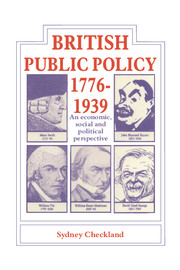Book contents
- Frontmatter
- Contents
- Preface
- Introduction
- Part I Industrialisation and war, 1776–1815
- 1 The state and the proto-industrial economy of Britain
- 2 Core and periphery: England, Wales, Scotland and Ireland
- 3 Social values and social policy
- Part II Assimilating the industrial revolution, 1815–51
- Part III The Victorian apogee, 1851–74
- Part IV Industrial maturity and the ending of pre-eminence, 1874–1914
- Part V Total war and troubled peace, 1914–39
- Bibliography
- Index
1 - The state and the proto-industrial economy of Britain
Published online by Cambridge University Press: 05 August 2012
- Frontmatter
- Contents
- Preface
- Introduction
- Part I Industrialisation and war, 1776–1815
- 1 The state and the proto-industrial economy of Britain
- 2 Core and periphery: England, Wales, Scotland and Ireland
- 3 Social values and social policy
- Part II Assimilating the industrial revolution, 1815–51
- Part III The Victorian apogee, 1851–74
- Part IV Industrial maturity and the ending of pre-eminence, 1874–1914
- Part V Total war and troubled peace, 1914–39
- Bibliography
- Index
Summary
Political and industrial revolutions
The domestic economy over which the British parliament presided after 1776 was being remade from within by the atomistic decision of individuals and groups of individuals who, secure in the state's defence of property rights and equality before the law, were busy creating new productive and trading enterprises, embodying a new range of technology and inducing a new set of economic and social relationships. Governments had little to do with this great renovation. Paradoxically, the British state was intensely concerned with the effects of political revolution abroad, in North America and France, but scarcely at all with the industrial revolution at home.
It is perhaps not surprising that those who operated the British state had no real comprehension of the processes of industrialisation or concern with them. The political settlement consolidated in England by 1688 was conceived in terms of the control of central power and its subjection to the will of parliament. The landowners, in constructing defences for their property against the arbitrary will of the state in the form of the Stuart monarchs, created a system that could become, though somewhat inadvertently, a defence of the liberties of all. This it did through the enforcement of the supremacy of parliament, the rule of law, the independence of the judiciary and of juries, the requirement of due process and a relatively free press. Though the King still chose his ministers, they needed a majority in parliament in order to govern.
- Type
- Chapter
- Information
- British and Public Policy 1776–1939An Economic, Social and Political Perspective, pp. 11 - 31Publisher: Cambridge University PressPrint publication year: 1983



